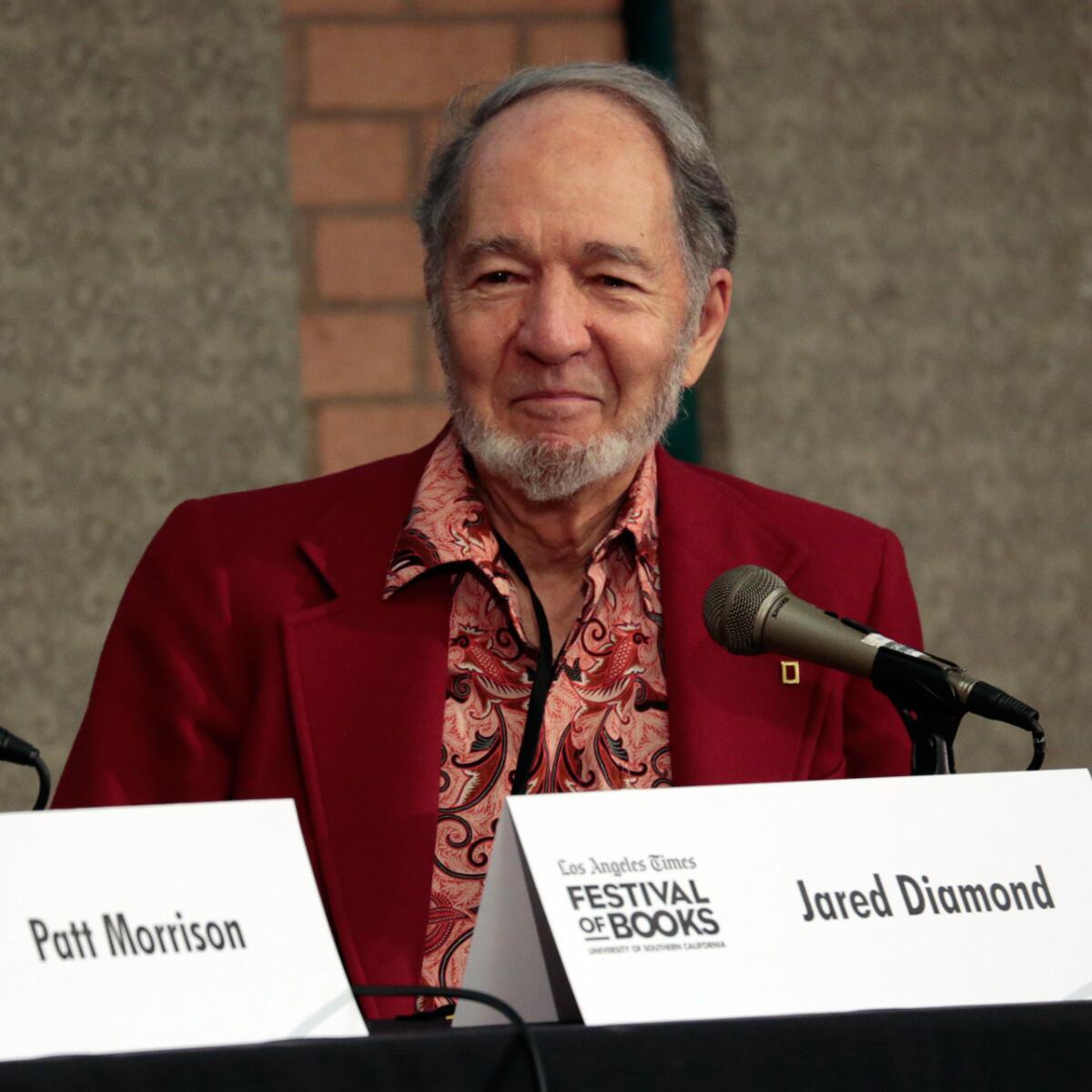Jared Diamond says he’s 51% hopeful we won’t destroy ourselves

- Share via
According to Jared Diamond, the Pulitzer Prize-winning writer (“The World Until Yesterday,” “Collapse,” “Guns, Germs, and Steel”) who spoke to Patt Morrison about his work Sunday, Americans shouldn’t waste time worrying about statistically rare crises like terrorism or plane crashes.
“I’ve already done the most dangerous thing I’m going to do all day -- taken a shower,” he said at the Festival of Books in his strong New England accent.
Lest people conclude that he was irrationally obsessive, Diamond laid out the statistics: “I’m 76 years old. Life expectancy for a man is 91 years. Fifteen years of life multiplied by 365 days is 5,475 showers. If my risk of slipping is 1 in 1,000, I’m going to kill myself 5 1/2 times.”
His facility with statistics is only one of the impressive qualities of Diamond, a polymath who trained in physiology and is currently a professor of geography at UCLA. Diamond’s published work has made him, as Morrison put it in her introduction, “an eminence in the social sciences.”
FULL COVERAGE: Festival of Books
Listening to him speak was like listening to one of those mind-blowingly erudite professors who can change a student’s life. There seemed to be no question that didn’t inspire him, no topic he couldn’t discuss insightfully.
Times columnist Morrison, wearing one of her trademark large hats (it resembled large wheat sheaves folded artfully into a kind of crest that projected at least a foot in front of her) set a brisk and demanding pace with her probing and insightful questions.
Diamond’s latest book “The World Until Yesterday” looks at the differences between modern American culture and the traditional societies in which people lived until very recently. Diamond said he agreed neither with the notion that culture is a process of improvement away from primitive man, nor with Rousseau’s idea of the “noble savage.” What interests him, he says, is how modern and traditional societies differ, how they are alike and what they can teach one another.
He drew his inspiration from spending time in New Guinea, where he first went to study birds, where people live much the way our ancestors did before the rise of modernity.
A traditional society, he said, is necessarily a small one--about the size of a high school where you can easily know everybody’s name. Strangers are rare and dangerous. Diamond pointed out that although he and Morrison did not personally know most of the people in the audience, at no point had they made any move to kill any of us. Nor had we threatened him. In New Guinea, he said, he would be terrified to encounter a group of strangers.
Other differences between our world and that of people a few generations ago emerged: Child-rearing, justice, and perhaps most strikingly, the role of the individual in the community. “A cynical person could say America is made up of individuals doing things to get ahead that are bad for society.” Burning fossil fuels, for example, which is “going to mean curtains for everybody in 50 years.”
INTERACTIVE GAME: How to be a writer
In New Guinea, in contrast, the community comes first: Individuals are not permitted to seek personal advancement. But the introduction of pockets in clothing and opaque plastic bags is changing that a little bit: Individuals are likelier to be selfish when the community can’t actually see what they have.
The traditional societies that remain on the Earth could be called “transitional societies,” Diamond said, because modern life is changing them. But there is still a lot of tribalism in many parts of America.
His mastery of so many fields has made Diamond perhaps more aware than anybody else on Earth of the many threats we face, both as individuals and as a species. But he says he’s more optimistic than he was when he wrote “Guns, Germs, and Steel” in 1997 or “Collapse” in 2005.
“I’m cautiously optimistic.We’re in a horse race between the horse of destruction and the horse of salvation. I’m 51% hopeful that we’ll find the solutions to the problems that threaten us, and the horse of salvation will win.”
What can we do to change the world? Vote. With only 20% voter turnout for the L.A. mayoral race, Diamond says, “We deserve the bad government we’re getting.”
More to Read
Sign up for our Book Club newsletter
Get the latest news, events and more from the Los Angeles Times Book Club, and help us get L.A. reading and talking.
You may occasionally receive promotional content from the Los Angeles Times.







